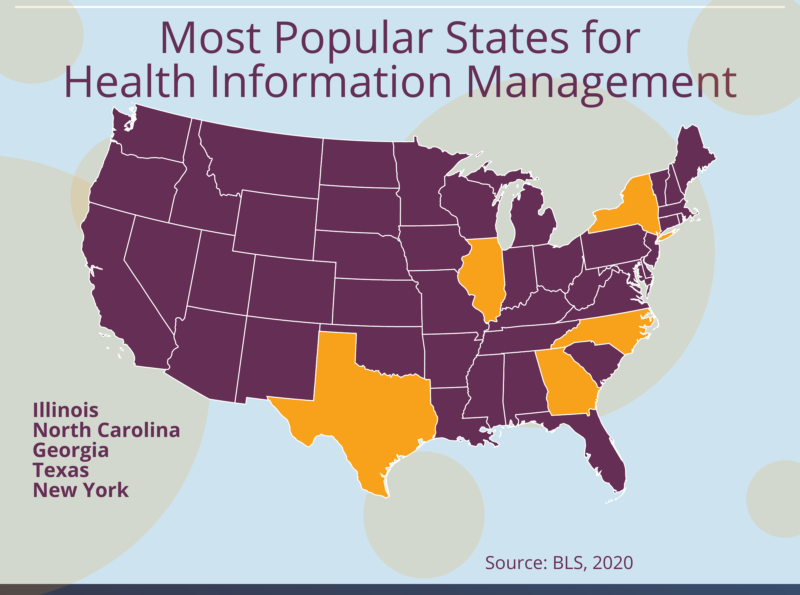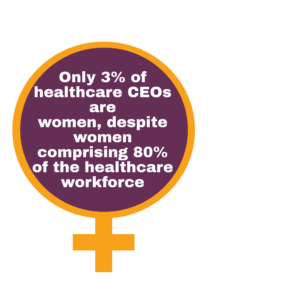If you enjoy helping others stay healthy, and also love tech and data, a health information management degree may be a great fit for you. Commonly described as an intersection of technology, health, and business, careers in health information management allow you to work closely with physicians and other healthcare providers to ensure that patients stay safe and get the healthcare that they need.
Let’s take a look at some of the most commonly asked questions about careers in health information management.
What is Health Information Management?
If you’re new to the healthcare field and interested in the many different careers available to you, you may be wondering, “what is health information management?” Whether you’ve realized it or not, you’ve participated in the health information management process in the past. Each time you go to the doctor, you’re either asked to fill out new forms or to look over old forms to ensure that your information is the same. Your health information is essential to allowing your doctor and other healthcare providers to treat you in a way that’s safe and makes sense for your body. This information is managed by health information management professionals. People in this role are responsible for ensuring that information is accurate, safe, and available to the people who provide you with medical care.

What can you do with a health information management degree?
If you’re beginning to learn about the field, you may be wondering, “What can I do with a health information management degree?” or “Is a health information management degree worth it?” There are many different options for people who earn a degree in health information management. Your other interests will play a role in the type of career that will make the most sense for you after graduation. Before you begin to apply for jobs, you’ll want to take some time to think about the environment you prefer. You may enjoy working in a setting with children, or you may prefer a quiet office. No matter what type of job makes the most sense for you, you’ll have many options with your health information management degree.
Some of the most popular career options for people who earn their degrees in health information management include HIM director, medical coder, clinical documentation improvement specialist, health data analyst, compliance auditor, patient advocate, security officer, and privacy officer. Some people with degrees in this field also go into administrative practice management, putting their understanding of healthcare information compliance and safety to use by ensuring the practice they manage is following all necessary regulations to stay in compliance with the law.
Is health information management a good career choice?
As rules and regulations for healthcare information are constantly changing to better protect patients, the need for professionals in this field is growing fast. While the average career path in the United States is growing at a rate of 7%, careers in health information management are expected to grow by 13% by 2026.
Earning a degree in health information management can allow you to work in many different settings, including hospitals, private clinics, public healthcare services, surgery centers, long-term care facilities, nursing homes, behavioral health facilities, veterans administration, and more. When you earn your degree in health information management, you’re opening yourself up to a world of possibilities. Most facilities that provide medical care have struggles in the area of perfecting their patient privacy procedures, and a well-educated health information management professional can serve them well.
School/Program Accreditation
When you earn your health information management degree, it’s key that you attend an accredited school. Let’s take a look at what it means for a program to be accredited, and what else you need to consider along the way to ensure that your hard-earned degree will help you with your career goals.
What kind of accreditation should I look for in a health information management program?
When you decide that you’re ready to get your degree in health information management, it’s essential that you find a program that’s accredited by the Commission on Accreditation for Health Informatics and Information Management. This ensures that your degree is legitimate, and lets potential future employers know that the program you completed was held to a high standard. When exploring programs, be sure to check out their website to ensure that their program has gone through the CAHIIM accreditation progress and meets CAHIIM accreditation standards. If you can’t’ find the information on their site, talk with an academic advisor to find out whether the program is accredited. If it’s not accredited, move on. You don’t want to spend your time and money on a program that won’t qualify you for jobs after graduation.
Are there specialized accreditations for health information management programs?
Within your CAHIIM accredited program, you may have an option to become a registered health information administrator or RHIA. The testing process for RHIA is run through CAHIIM. If you’re interested in earning this high-level certification, be sure to talk with your academic advisor about whether your program will prepare you for the RHIA exam.
Types of Health Information Management Degrees
When you’re beginning to research the options for getting your degree in health information management, it can be confusing to see all the options presented to you. Let’s take a look at the different options and specialties for people who are interested in getting a bachelor degree in health information management.

What’s involved in earning a bachelor degree in health information management?
When learning more about earning your bachelor degree in health information management, you’ll find that there are different options for getting your degree. If you prefer, you may enroll in a traditional school and go through the standard classroom experience — traveling from class to class, enjoying group work, and listening to in-person lectures. If you’re already working, or if you’re a non-traditional student, it may make more sense for you to earn your bachelor of science in health information management online. This type of education is widely recognized by employers as just as valuable as traditional, in-classroom education.
Are there specialties within a health information management bachelor’s degree program?
As you earn your health information management bachelor’s degree, you may find that your school offers specialties to take your education one step further. These may include becoming a registered health information administrator, or RHIA. Other specialties include becoming a certified documentation improvement practitioner, a certified health data analyst, or a specialist in healthcare privacy and security. Professionals in this role are certified to manage other employees. To become an RHIA, you must sit for a standardized test to earn your certificate. Talk with your program’s advisor to learn more about what you need to do to prepare for the RHIA test within your bachelor’s degree program.
Online Programs
There are many reasons why students choose to complete online programs rather than going through a traditional classroom experience. Many people who take classes online work full-time, or may have children at home who they want to spend time with after a long day at work. Other people who take classes online may have obligations such as taking care of older parents or working multiple jobs. No matter what your reason for wanting a flexible schedule, there are many online classes available for people who want to earn their health information management degree.
Can I earn my bachelor of health information management online?
For many students, earning a degree online makes more sense than going to a traditional classroom. Even for traditional students, taking at least some classes online can save valuable time and money. The cost of commuting back and forth to class and having to work on someone else’s schedule can add up quickly. Many programs allow you to earn your entire health information management bachelor’s degree online.
When I get my online bachelor’s degree in health information management will I do work on my own time?
This is a great question! Some programs that allow you to earn your bachelor’s in health information management online allow you to work completely at your own pace, making it easy for you to get work done on your own time. Other programs require that all students in online bachelor’s in health information management courses be online at the same time. If you have a work schedule that isn’t flexible, it’s important to talk with your school to find out what kind of schedule your bachelor degree in health information management online courses require.
Certifications/Licenses
As with any healthcare degree, it’s key that you’re certified to perform your health information management job after you graduate. Let’s take a look at some of the certifications and specialties you need under your belt before you’ll be able to begin your health information management career.
What types of health information management certification do you need to get a job?
If you’re thinking about earning your bachelor’s degree in health information management, you must understand exactly what you’ll need to do to make yourself competitive in the job market after graduation. Many nuances come with health information management, and certification ensures that you understand the ins and outs of the job. The American Health Information Management Association, or AHIMA, is the governing body for certification in the field. An AHIMA coding certification ensures that you’re properly qualified to work a health information management job.
How do you get an AHIMA coding certification?
To get your AHIMA coder certification, you’ll need to first choose which makes the most sense for your career goals. There are several different AHIMA coding certifications, including registered health information administrator, registered health information technician, certified coding associate, certified coding specialist, and certified coding specialist physician-based. No matter what AHIMA certification program you choose, it’s essential that you ensure it meets your long-term goals. After you complete your certification requirements, you’ll need to provide your employer or future employer with AHIMA certification verification.
Careers in Health Information Management
When you earn your degree in health information management, you may feel overwhelmed at all of the career and work setting options presented to you. Let’s take a look at some of the most popular career options for people who earn their bachelor’s degree in health information management.

What are the best health information management careers?
When you’re earning your health information management degree, you must search out information on health information management careers that interest you. The field presents many opportunities in a wide variety of settings. While there are many different options when it comes to choosing a healthcare information management career, some of the most popular HIM career paths include data quality manager, department director, medical research analyst, applications systems analyst, database administration manager, and healthcare data analyst.
Where do people with careers in health information management field usually work?
One of the great things about the many health information management opportunities available in today’s job market is the variety of settings in which people who are interested in a health information management career can work. While it’s natural to think that people who have a bachelor of science in health information management jobs might only be available in a hospital setting, this isn’t true. People who have their bs in health information management jobs can work in private care settings, nursing homes, college health settings, insurance, schools, government agencies, public health facilities, research institutions, managed care facilities, and more. If a setting deals with people’s private health information, they have a need for someone who has their bs in health information management jobs.
What’s the job outlook for health information management?
If you’re interested in what you can do with bachelors in health information management jobs, good news: the need for people with their degree in this field is on the rise. The career outlook for health information management jobs is great — a 13% increase is expected in the need for him degree jobs by 2026, compared with an average growth of 7% for jobs in other fields. Compared to most areas, the health information management job outlook is positive. If you’re new to the field, you’re especially in luck. Since the federal and state regulations for protecting healthcare information are constantly changing, companies are always on the lookout for recent grads who know the ins and outs of the latest developments in the field.
Health Information Management: Salary
If you’re ready to get your degree in health information management, you’re probably wondering, “how much is health information management salary?” While many factors can cause exact numbers to fluctuate, it’s a good idea to look at national averages to find out if the current health information technology pay rate is sufficient to support your lifestyle. Let’s take a look at some of the most commonly asked questions about a degree in health information management salary.

What’s the average health information management salary?
If you’re getting your degree in health information management, it’s natural that you’d be curious about the average health information management salary. Many different things can factor into the salary for health information management, including years of experience (both in and out of the health information management field), qualifications, specialties, education level, GPA, and more. Your salary for health information management will also depend on the cost of living in your area, as well as how competitive the job market is at the time you get an offer.
What’s the difference between health information management salaries for an associate’s degree compared to a bachelor’s degree?
Health information management salaries are quite different from the associate’s to the bachelor’s level, and it’s well worth it to finish your degree. The average salary of health information management for someone who has their associate’s (2‑year) degree is $50,000, while the average salary of health information management for someone who has their bachelor’s (4‑year) degree is $65,000. When you’re considering your health information management careers salary, you’ll want to consider the benefits offered by the company in addition to the paycheck you’re offered. When companies offer perks (like paying for your higher education, such as your master’s degree), it can mean that your actual health information management careers salary is much higher than the number on your paycheck.
What is the health information management salary by state?
Of course, an HIM degree salary can differ greatly from state to state. The average salary for health information management technology can differ greatly depending on the cost of living in your area, as well as how highly in demand people with an HIM degree are at the time you’re offered a position. New Jersey, California, Connecticut, and Hawaii offer the highest health information management salary range, while Arkansas, Mississippi, Idaho, and Georgia offer the lowest health information management hourly salary. Don’t make your decision on where you’ll decide to live after you earn your degree based on the health information management starting salary alone. There are many different factors to consider when you decide if the salary of a health information manager is enough to make you move to a new state. You’ll want to consider the cost of living, the cost of continuing education, and whether the company to which you’re applying offers advancement opportunities. These considerations can help you realize if staying put may be a better choice, even if the health information administrator salary isn’t as high as you’d initially like.
Moving Up: What’s a director health information management salary?
If you’re getting your degree in health information management, you’re interested in more than just healthcare. You also enjoy the business and technical aspect of the office, and you’re likely interested in moving to a higher position over time. Understanding whether there’s room for advancement at your company can be an important factor in how much your health information management bachelor degree salary can grow over time. Experience and education can play in largely to how much money you make as a director health information management.
A director health information management salary for someone who is at the mid-level of their career may be much lower than someone who has more experience and is nearing retirement age. For mid-level directors, the average salary is approximately $67,000. This is quite different than a more experienced director, who makes, on average, $79,000. Of course, years of experience are not the only factor at play when determining how much money you’ll make. Your GPA during your education, your recommendations, and prior work performance can all factor into a company offering you a higher (or lower) pay rate than average. Don’t be afraid to negotiate your pay — often, companies have a range that they’re able to offer applicants, but they can only do so if you ask for a higher amount.
Overall, how much do health information managers make?
It may be confusing to understand how much does health information management make, since there are so many different factors at play when it comes to determining a salary. The health information manager salary range can go from approximately $38,000 to $79,000, depending especially on years of experience and cost of living in the area. Getting your bachelors in health information management salary can be a great way to create a long-lasting career that you love. When you enjoy the work that you do, you’ll love learning new things and continuing your education, making it more and more likely that your bachelor of science in health information management salary will continue to increase over time. Your health information technology bachelor degree salary may start on the low end of the range, but can easily hit the high end as you advance throughout your career.
Professional Organizations in Health Information Management
As a health information management professional, it’s key that you become a member of professional organizations to help you with your career. These organizations provide valuable networking opportunities, professional development, continuing education, and can help you in your job search. Here are three of the most popular professional organizations for health information management professionals:
- The American Medical Informatics Association (AMIA)
- Health Information and Management Systems Society (HIMSS)
- American Health Information Management Association (AHIMA)
Joining a professional organization can go a long way in helping you begin and continue to grow your career.
Related Rankings:
25 Best Bachelor’s in Health Information Management
15 Best Online Bachelor’s in Health Information Management
10 Fastest Online Bachelor’s in Health Information Management
10 Most Affordable Bachelor’s in Health Information Management
